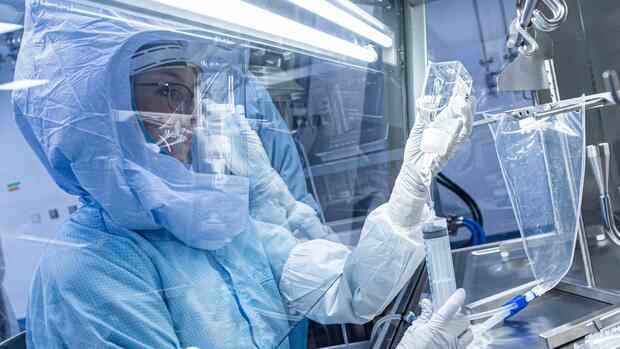High government grants, loans and guarantees possible.
(Photo: dpa)
The Federal Ministry of Economics is planning, together with France, to classify a new sector in the series of “Important Projects of Common European Interest” (IPCEI). This is likely to be the pharmaceutical industry in the field of gene and cell therapy, the Handelsblatt learned from government and industry circles. The final decision has not yet been made, but gene and cell therapy, especially with regard to mRNA research, is the clear favorite, it said.
IPCEIs represent important projects of common European interest that several Member States can initiate jointly. They should “have a significant impact on competitiveness, sustainability or value creation in the EU”, where market failure seemed to have existed so far, in order to guarantee economic independence.
Businesses can apply to participate, which allows them high government grants, loans and guarantees. So far there is IPCEI for hydrogen, battery cell production and the chip industry. Tesla’s battery factory in Grünheide, for example, is being funded with 1.4 billion euros.
In May, Chancellor Angela Merkel, EU Commission President Ursula von der Leyen, Economics Minister Peter Altmaier and Health Minister Jens Spahn (all CDU) held talks with French President Emmanuel Macron. The result was the plan to network collaboration in the area of health more closely in response to the experience of the corona pandemic.
Top jobs of the day
Find the best jobs now and
be notified by email.
It was to be expected that IPCEI would not be able to focus on the entire health sector. The mass of applications would not have been manageable. The topic of cloud computing was also discussed, report those involved. The Federal Ministry of Economics said on request that the content of the IPCEI was still being discussed.
The IPCEI are a central instrument in the Minister of Economics’ industrial strategy.
(Photo: imago images / Chris Emil Janßen)
However, those involved report that the choice will most likely fall on the area of gene and cell therapy, especially because of its increasing relevance. That is what the mRNA-based corona vaccines would have shown. In addition, the hope for treatment methods for cancer and Alzheimer’s diseases lies in gene and cell therapy.
At the same time, there is a risk that Germany will fall behind in these approaches compared to countries like China. “We are being left behind more and more,” they say. The area is sensibly accommodated in an industrial strategy because there is a need, above all, to promote commercialization and to build up larger production capacities.
The French are now coordinating the preparatory work. In addition to Germany, other member states can join. Austria, Ireland and Hungary are said to have already signaled their interest. Germany’s participation is, however, subject to the formation of a government.
The IPCEI are a central instrument in the industrial strategy of Minister for Economic Affairs Altmaier. With the FDP he had thus earned considerable resentment. The liberals have never been able to do anything with state-controlled economic policy. This is exactly what they see in the industrial strategy – and especially in the IPCEI.
Therefore, the German role in the planned health projects is likely to depend to a large extent on the current talks between the SPD, the Greens and the FDP. Coalition negotiators have already heard that the FDP does not think much of a continuation of the IPCEI. The topic could already play a role in the coalition agreement. Even if not: It is quite possible that the Federal Minister of Economics will come from the ranks of the FDP. It is at least questionable that the latter would continue to support the approach.
Lengthy process
It is clear that Altmaier will no longer be able to irrevocably get the project off the ground. First, the Member States have to work out the concepts. In France, presidential elections are due in April 2022, which is likely to delay the process. Then the EU Commission still has to give the green light. The states then need clarity about the financial resources that they can use. That will take longer, especially in Germany. Due to the change of government, the federal budget will not be decided until the middle of the year.
There are different statements about when the first money can flow. Most, however, expect a period of three to four years. “It has nothing to do with the dynamics that it needs. Until then, we will no longer play a role in the subject, ”says a senior representative of the association. After all, some expect a faster process.
More: Growth forecast capped – financing of traffic light projects questionable.
